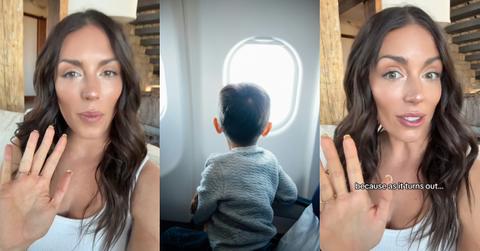Woman Recounts Chilling Story of Flight as a Minor, Sparking Conversation on Childrens’ Safety
"So glad you’re safe and he outed himself."
Published Nov. 9 2024, 4:00 a.m. ET
TikToker Taylor (@taylormakesvideos) has stirred up a major conversation with a video recounting a deeply unsettling experience she had while flying alone as an 11-year-old. In her story, which has 1.5 million views, Taylor describes how an older man sat next to her on the flight, struck up a conversation, and later began sending her creepy letters, causing her family to seek a restraining order.
In the video, Taylor narrates: “Put a finger down if when you were 11 years old, you got sat next to a 40-year-old man on a flight as an unaccompanied minor.” She explains that at the time, her family was building a house, and she had been given a notebook to jot down design ideas for her new room.
She recalls, “As you’re sketching in your little notebook … this grown man next to you starts asking you about it. And you’re 11, so you don’t think anything of it. … He starts asking where the house is going to be and where you go to school.” Thinking nothing of it, Taylor remembers feeling, “Oh, this adult is being nice to me.”
The experience took a creepy turn when Taylor’s mom picked her up from school one day and started asking about the man she had sat next to on the flight. As it turns out, the man had tracked down Taylor’s school and sent her letters describing how he envisioned her new bedroom and expressing interest in seeing it in person.
Thankfully, the school did not forward the letters to Taylor. Instead, they passed them along to her parents, who immediately took action to protect her. Taylor recalls the surreal experience of providing a statement for a restraining order before she had even hit puberty.
Commenters were quick to share their reactions, many expressing shock and frustration at the lengths the man had gone to track Taylor down. “Sending them to your school is crazy work,” one user wrote.

Others highlighted how common, yet terrifying, these situations can be, with one high school teacher sharing: “I’m a high school teacher who wears my school shirts places, and the amount of times men ask me what grade I’m in is terrifying.”
The story also resonated with those in the aviation industry. A flight attendant commented, “As a flight attendant, this makes me want to be even more vigilant. I am so sorry this happened to you.”
The comments section became a space for support, safety tips, and calls for greater awareness of how we protect young travelers.
Taylor’s experience serves as a reminder of a concerning trend in harassment directed at young people. While instances of minors obtaining restraining orders aren’t well-documented, they’re not unheard of — and many states are expanding the legal measures available to protect them.

In fact, many U.S. states now allow minors to seek restraining orders against adults, sometimes with the help of an adult or through expedited processes designed to protect young victims.
Online harassment statistics further illustrate the broader context of the problem. A 2018 Pew Research Center survey found that 59 percent of U.S. teens had experienced some form of online harassment, and recent reports indicate that harassment frequently escalates to more serious predatory behaviors. Studies by the FBI estimate that over 500,000 online predators are active daily, often targeting minors through social media and online games.
The Crimes Against Children Research Center reports that 13 percent of minors aged 10 to 17 have received unwanted sexual solicitations online, many involving grooming behaviors—an intentional manipulation tactic used by predators. The National Center for Missing & Exploited Children (NCMEC) documented a 97.5 percent increase in online enticement reports, shedding much needed light on the rising prevalence of adult predators targeting minors in virtual and physical spaces alike.

In response to these troubling statistics, laws have evolved to provide minors with greater protection against harassment and stalking. The Violence Against Women Act (VAWA) includes specific provisions for minors who have faced harassment, emphasizing the importance of providing quick access to legal resources.
Still, the psychological toll of such harassment on young people can be extreme. Victims often experience anxiety, depression, and even PTSD as a result of predatory interactions, which serves as a call to action for more accessible resources and education on recognizing red flags.
Taylor’s story speaks to how attitudes around unaccompanied minors have changed over the years. While policies on flights have become stricter, and awareness has grown about the importance of protecting young travelers, these issues remain prevalent. Today, many airlines and public spaces enforce more structured policies for minors, but stories like Taylor’s still occur on a regular basis.

Creating safer spaces for children and teens — whether they’re on a plane, in school, or online — requires vigilance, as well as continued efforts to increase awareness among caregivers, educators, and service workers.
